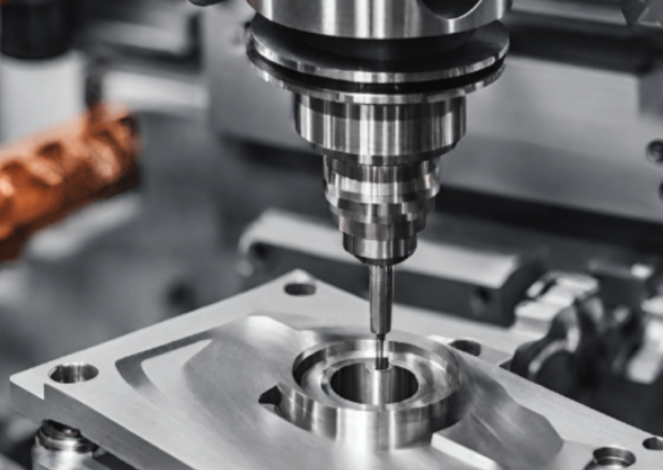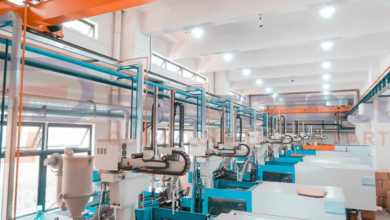Choosing the Right CNC Machining Manufacturer: A Complete Guide for Precision Projects

In today’s era of high-speed, high-precision production, partnering with a trusted cnc machining manufacturer is one of the smartest moves for businesses involved in manufacturing, engineering, or product development. CNC (Computer Numerical Control) machining has revolutionized how parts are produced—allowing for extreme precision, repeatability, and efficiency across countless industries.
Whether you’re developing prototypes, producing automotive parts, or manufacturing aerospace-grade components, choosing the right CNC machining manufacturer plays a critical role in your success. In this article, we’ll explore what to look for in a machining partner, key benefits of CNC machining, and how the right supplier can improve cost-efficiency, scalability, and product performance.
Understanding CNC Machining: What It Means for Manufacturers
CNC machining is the process of removing material from a workpiece using computer-controlled tools like mills, lathes, drills, or grinders. The goal is to produce a part that exactly matches a 3D CAD design with exceptional precision. A reliable cnc machining manufacturer will offer multiple machining services under one roof, including:
- CNC milling
- CNC turning
- Drilling
- Grinding
- Wire EDM
- Surface finishing
These capabilities are used across industries such as medical devices, consumer electronics, defense, energy, and robotics, making CNC machining one of the most flexible forms of modern manufacturing.
See also: How AI Face Swap Technology Is Shaping Influencer Marketing
Why Working with a Reputable CNC Machining Manufacturer Matters
You can’t afford to work with just any supplier. An experienced and reliable cnc machining manufacturer brings the following benefits:
1. Consistent Accuracy
CNC machines operate with incredibly tight tolerances—often down to ±0.005 mm. This ensures consistent, repeatable production runs, which is vital for precision industries like aerospace and medical.
2. Faster Production Time
When deadlines are tight, experienced manufacturers can run machines 24/7, deliver faster lead times, and scale up without sacrificing quality.
3. Material Versatility
From aerospace-grade aluminum to stainless steel, brass, titanium, and high-performance plastics, a quality cnc machining manufacturer will offer access to a wide variety of materials and advise on the best choice for your application.
4. Cost-Effectiveness at Scale
While prototyping might cost more per unit, large-volume CNC machining becomes more economical over time. Efficient machining setups and experienced operators help keep costs competitive.
5. End-to-End Services
The best manufacturers don’t just machine parts. They offer value-added services such as surface treatment, assembly, packaging, and quality assurance, giving you a one-stop solution.
Key Industries That Rely on CNC Machining
CNC machining is used nearly everywhere. Here are a few sectors where having a reliable cnc machining manufacturer is essential:
- Aerospace: Parts like brackets, turbine components, housings.
- Medical: Surgical instruments, prosthetics, diagnostic devices.
- Automotive: Engine blocks, gearbox parts, suspension systems.
- Electronics: Heat sinks, enclosures, connectors.
- Energy: Oil & gas components, wind turbine parts, solar energy fixtures.
Each of these industries demands strict tolerances, traceability, and quality certifications—all of which a dependable manufacturer can provide.
How to Choose the Right CNC Machining Manufacturer
With hundreds of manufacturers available globally, choosing the right one can feel overwhelming. Here are the top criteria to help you make an informed decision:
🔍 Certifications
Look for ISO 9001, AS9100 (for aerospace), ISO 13485 (for medical), or IATF 16949 (for automotive). These certifications ensure that the manufacturer follows internationally recognized quality standards.
📐 Machining Capabilities
Does the supplier offer 3-axis, 4-axis, and 5-axis machining? Can they handle small precision parts as well as large structural components? Ask for a list of equipment.
📁 Design & Engineering Support
A top-tier cnc machining manufacturer will offer DFM (Design for Manufacturability) support. This means they can analyze your part files and recommend design tweaks to improve performance or reduce costs.
📦 Prototyping and Mass Production
Whether you need a prototype in 2 days or a production run of 50,000 parts, your supplier should be able to scale accordingly.
🤝 Communication and Project Management
Fast, transparent communication is crucial. Look for suppliers who assign a dedicated project manager, offer regular updates, and are responsive via email or call.
Domestic vs. Offshore CNC Machining: What’s Right for You?
Depending on your project’s scale and timeline, you may be choosing between a local cnc machining manufacturer and one based overseas (like in China or Southeast Asia). Each has pros and cons:
| Option | Pros | Cons |
| Local (Domestic) | Faster delivery, easier communication, stronger IP protection | Higher cost, limited volume |
| Offshore (e.g., China) | Lower cost, large volume capabilities, 24/7 operation | Time zone difference, longer shipping, IP concerns |
A hybrid approach—using local vendors for prototyping and offshore suppliers for volume production—is often a smart strategy.
Technologies That Distinguish a Good CNC Machining Manufacturer
The best CNC suppliers invest in the latest technologies to ensure their clients get superior products and faster turnarounds. Look for the following capabilities:
- CAD/CAM integration for seamless part-to-machine execution.
- Real-time machine monitoring for efficiency and uptime.
- Automated tool changers and robotic arms for lights-out machining.
- CMM (Coordinate Measuring Machine) inspection to guarantee tolerances.
- ERP systems for order tracking, inventory, and reporting.
Questions to Ask Before Partnering
Before signing a contract, ask your prospective cnc machining manufacturer the following:
- What are your minimum order quantities?
- What tolerances can you guarantee?
- What materials do you commonly work with?
- Do you provide inspection reports?
- Can you handle post-processing (anodizing, painting, etc.)?
- What are your lead times for prototypes and mass production?
- How do you handle rework or part rejection?
Transparent answers to these questions will help you avoid hidden costs, delays, and quality problems.
Conclusion: Invest in Quality, Reap Long-Term Gains
Selecting the right cnc machining manufacturer is more than just a cost-based decision. It’s a long-term partnership that impacts your production speed, quality, and reputation. By aligning with a supplier that shares your values for precision, transparency, and innovation, you can streamline operations and meet your business goals with confidence.
As the global market continues to evolve, those who embrace precision manufacturing through trusted CNC partners will enjoy better control, stronger product consistency, and a serious competitive edge.





